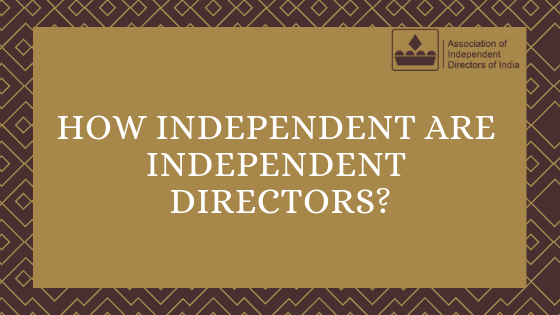On paper, the laws for independent directors in India are as rigid as anywhere else in the world. The issue is how well are they implemented. People do not generally understand the role of independent directors. Hence, if an independent director dissects from what the organisation has to offer, He/she gets a reputation of being inexpedient. While the paramount role of independent directors is to monitor the agency problem, which in India, is safeguarding the interests of stakeholders.
To carry out their roles effectively and efficiently, the independent directors should be independent enough to exercise vigorous oversight on the actions of the company.
These directors have a fiduciary responsibility regarding the minority shareholders or stakeholders and are expected to act in an independent way, irrespective of directives of the dominant shareholders. The prescription has, therefore, tightened the definition of independent directors and has bestowed upon them, additional powers while scrutinising related party transactions, executive compensation and financial statements of the subsidiaries.
However, the question that arises is, “are Independent directors really independent enough to act in favour of the stakeholders regardless of how the organisation functions?”. When it comes to this, regulators expect them to be clinical while the management and promoters expect them to be more practical and empathic. That’s the narrow rope they’re walking on. As witnessed recently, if an independent director does not toe the line of businesses, the ease with which an independent director is removed could set a dangerous example. Moreover, as per the section 169 of the Companies Act 2013, it asserts that any onboard director can be terminated by passing an ordinary resolution at a general meeting. This narrows down the line of distinction between independent and non-independent directors.
This is a peculiar problem in India since the shareholding of corporates is concentrated in the hands of few large promoter groups. When an independent director raises important concerns, which are consequential governance issues, there is a requirement of a policy which is based on a time-bound fact-finding investigation for such cases in future, perhaps for Nifty-50 or Sensex companies to start with.
In a US paper published by Kastiel and Nili, the authors argued that independent directors today, while being technically independent, are functionally still very dependent on management due to lack of time, adequate resources and imperfect information. These information gaps often lead to independent directors relying on the partially relevant information that the management provides or conceals.
Metaphorically speaking, Boards are black boxes, with debates going on behind closed doors that rarely spill out into public or to the independent directors as well in some cases. It is almost impossible to know which board members are dissenting from the party line and which are following the majority. So, the independent directors though working to the best of their abilities might still be misled into a trap and when the organisation is exposed of faulty practices, these nominee directors are the first ones to be blamed for it.
A 2005 law on independent directors (1/3rd of the listed company’s board shall be made up of independent directors), a 2013 law on the term of independent directors (not more than two successive five-year terms) and a 2015 deadline on female directors (there should be at least one female director on board of listed companies, whether independent or executive) have sought to improve the governance of Indian companies and the quality of their boards. They have succeeded in part, but, ultimately, a board is only as good as the independent directors on it and how independent these independent directors choose to be.

